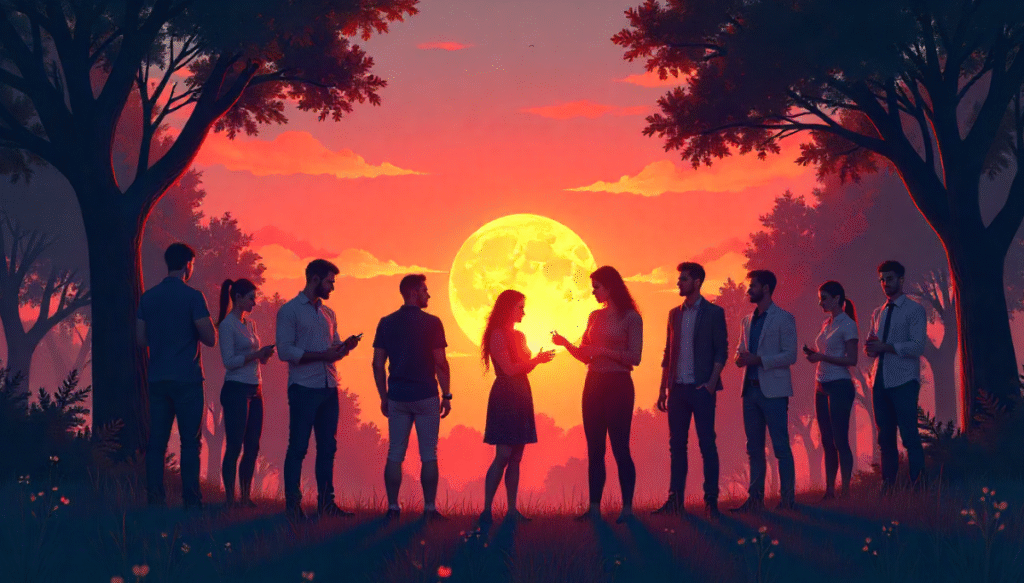Have you ever wondered What Time Does It Get Dark in your city? Many people ask what time does it get dark because they plan things like evening walks, family dinners, or even when to turn on the lights at home. The truth is, sunset times change every day and are not the same in every place. In summer, the sky stays bright much longer, but in winter, night comes very early. Knowing this can help you plan your daily routine, whether it’s playing outside, driving safely, or just enjoying the golden sky. It is simple, but also very useful, because darkness and daylight control many parts of our lives.
Darkness is not just about the sun going away. It also depends on your country, the season, and even if you live near the equator or far away from it. For example, in some places close to the poles, it can stay light almost all day in summer, while in winter it may get dark super early. In the middle of the world, like near Africa or Asia, the sun sets around the same time all year. This makes the question “what time does it get dark” very interesting, because the answer is different for everyone. If you understand how this works, you can use it for travel, health, and even saving energy at home. That is why learning about sunset times is more than just a fun fact—it is really helpful for daily life.
What Time Does It Get Dark? Easy Guide for Everyday Life
Have you ever asked yourself what time does it get dark in your city? This is a very common question because people want to plan their evenings. Maybe you want to go for a walk, play with friends, drive home safely, or sit outside and watch the sunset. The time when it gets dark is not the same every day and not the same in every place. Sometimes the sky stays bright for many hours, and sometimes night comes very fast.
The time of darkness depends on many things like the season, the country, and even how close you are to the equator. In summer, we enjoy long sunny days, but in winter, the nights are long and the sun sets early. This makes the question “what time does it get dark” very interesting because there is no single answer for everyone. If you understand why it changes, you can plan better, save energy, and enjoy life more. Let’s explore together.
What Time Does It Get Dark? Simple Answer Explained
The short answer is: it depends on where you live and the date of the year. Darkness usually comes about 20–40 minutes after sunset. But sunset itself changes daily. For example, in June, days are longer, so it gets dark much later. In December, the days are short, and darkness comes very quickly.
When people ask what time does it get dark, they often mean when the sun sets. But the sky does not turn black right away. First, there is twilight, when the sky is still a little bright. After twilight ends, real darkness comes.
Why Sunset Times Are Different in Every Season
Have you noticed that in summer you can play outside until 8 or 9 pm, but in winter it is dark before dinner? This is because of the Earth’s tilt. The Earth moves around the sun in a tilted way, not straight. This tilt changes the length of day and night during the year.
In summer, the sun stays in the sky for a longer time, giving us more daylight. In winter, the sun’s path is shorter, and it sets earlier. That is why what time does it get dark changes with the season.
How Your Location Changes What Time It Gets Dark
Your location is another big reason for sunset changes. If you live near the equator, like in countries around Africa or Asia, the sunset is almost the same time every day, all year. But if you live far from the equator, like in Canada or Norway, the difference is huge.
In Norway, for example, the sun may stay up all night in summer, and in winter, it can get dark in the afternoon. So asking what time does it get dark will give very different answers depending on your location.
What Time Does It Get Dark in Summer vs Winter
Summer evenings are long and bright. In many countries, it may not get fully dark until 9 or even 10 pm. This makes summer perfect for outdoor fun. Winter, on the other hand, brings early sunsets. In some places, it may be dark by 4 or 5 pm.
This big difference is why people often ask what time does it get dark. It helps them plan their daily life, like when to come home, when to exercise, or when to switch on the lights.
Why the Sky Stays Bright After Sunset (Twilight Explained)
Even after the sun sets, the sky does not turn black right away. This is because of twilight. Twilight is the soft light that stays in the sky when the sun goes down. There are three types: civil twilight, nautical twilight, and astronomical twilight.
- Civil twilight: The sky is still bright enough to see without lights.
- Nautical twilight: It is darker, but sailors can still see the horizon.
- Astronomical twilight: The sky is almost fully dark, perfect for stargazing.
How to Find Out What Time It Gets Dark Today
It is very easy to check what time it gets dark in your city today. You can use weather apps, Google search, or even special websites that show sunrise and sunset times. Just type your city name with “sunset time” and you will get the exact answer.
This is helpful if you are traveling or planning an outdoor event. Knowing what time does it get dark helps you be safe, enjoy your time, and not get caught outside in the dark without planning.
Fun Facts: Places Where It Never Gets Fully Dark
Did you know that in some places, it never gets fully dark during some months? This happens near the North Pole and South Pole. In summer, the sun does not set at all for weeks, and it looks like daytime all the time. This is called the “Midnight Sun.”
In winter, the opposite happens. The sun may not rise for weeks, and it stays dark almost all day. For people living there, the question what time does it get dark is very different from the rest of the world.
Why Knowing What Time It Gets Dark Helps in Daily Life
Knowing what time does it get dark is not just a fun fact—it is useful in many ways. For example:
- You can plan safe travel and driving.
- Kids can play outside safely before it gets too dark.
- You can save energy by knowing when to turn on the lights.
- Farmers and outdoor workers can plan their jobs better.
- Travelers and photographers can enjoy sunsets at the best time.
Conclusion
So, what time does it get dark? The answer depends on the season, your location, and the date. Darkness usually comes a little after sunset, but twilight makes the sky stay bright for a while. In summer, nights come late, and in winter, they arrive early. For people near the equator, times stay almost the same, but for those far away, the difference is huge.
Understanding when it gets dark helps you in many ways—planning your evening, staying safe, and even enjoying nature. Next time you wonder about the dark, remember: the Earth, the sun, and your place on the map all work together to decide the time.
FAQs
Q1: Does it get dark right after sunset?
No, it takes about 20–40 minutes after sunset for full darkness. Twilight makes the sky stay bright for a while.
Q2: Why does it get dark later in summer?
Because the Earth is tilted, in summer the sun stays longer in the sky, so nights come later.
Q3: Is sunset the same everywhere in the world?
No, it depends on your location. Near the equator, times are almost the same every day. Far north or south, times change a lot.



